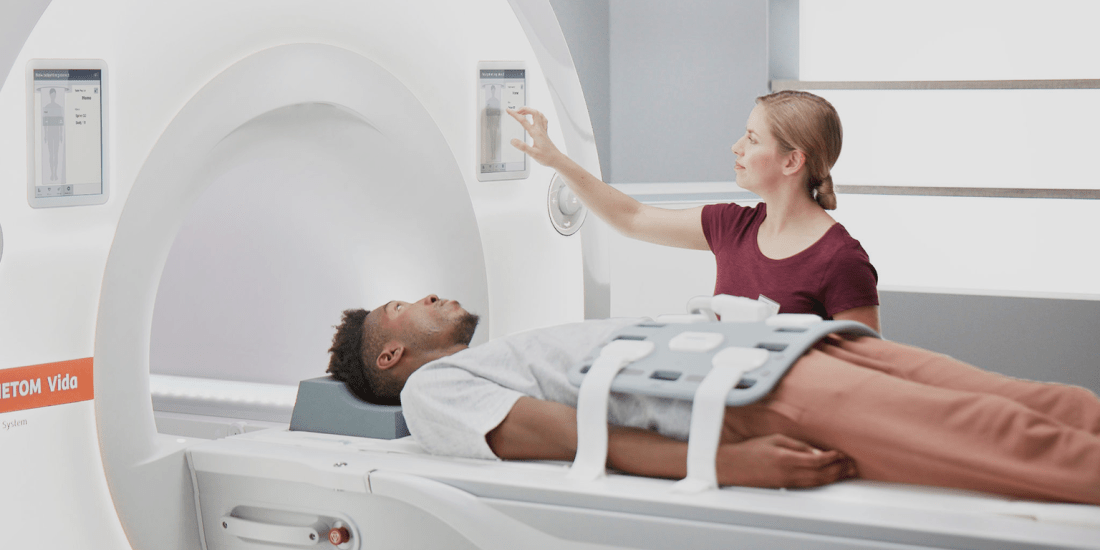Meet Ezra, a new way to screen for cancer
[Originally posted on Medium]
18.1 million¹ people across the world will be diagnosed with cancer this year, and over half will be diagnosed late². Of the 9 million people who will receive a late diagnosis, only a third will survive longer than 5 years³. If their cancer had been detected earlier, more than 85% of these men and women would survive. That’s 5 million lives that could be saved by early detection every year. So why isn’t everyone having their cancer detected early?
Screen for cancer, save more lives
I’ve been interested in cancer screening my whole life. As a child, I developed hundreds of moles over my body that put me at increased risk of melanoma. Having annual dermatology check-ups to screen for abnormal moles has always been part of my life. Then, in 2015, a friend introduced me to Hospices of Hope, a non-profit in Romania that builds and operates hospices for terminally ill cancer patients. Speaking to patients and their doctors helped me learn that one of the biggest problems in cancer is the lack of a fast, accurate, painless way to screen for cancer anywhere in the body. So I embarked on a personal quest to see if we could use technology to help everyone in the world detect cancer early.
Inspiration and a new idea
I spent the following two years reading about cancer, meeting with doctors, speaking to scientists, and trying to learn everything I could about the disease. I cycled through a dozen different ideas, ranging from DNA nanobots to digital microfluidics biochips (neither technology is ready for clinical use), with the goal of finding a way to screen for cancer anywhere in the body with a single test. And then, while reading research papers on my honeymoon (I know!), it hit me. One morning I asked my wife, “What if you could get a full-body MRI scan and have it analyzed by AI in order to detect cancer anywhere in your body? Would you sign up for that?” She loved it, and that’s how Ezra was born: a direct-to-consumer membership that offers cancer screening using a full-body MRI analyzed by AI.

Validation
I returned from my honeymoon and started reading everything I could about MRI. My previous company, Brainient, had just been acquired by Teads, and I had been promoted to CEO of Teads Studio and Global CMO. But I devoted my nights and weekends to researching this new idea. Then, in January 2017, a study⁴ published in Lancet convinced me that I was on the right track. The study compared the current standard of care for prostate cancer screening — a PSA (prostate-specific antigen) blood test, followed by a prostate biopsy if PSA levels are elevated — with an alternative, a prostate MRI. The conclusion? When prostate biopsies are guided by MRI findings, 18% more clinically significant cancers are detected. And there was more: using MRI to triage men decreases the number of unnecessary biopsies by 27%. In other words, MRI yields a more accurate, less intrusive test with a better patient experience. I was sold.
To validate that this can work, decided to focus on a single type of cancer initially — prostate cancer. I chose prostate cancer because it is the most common cancer in men, and because the current standard of care for prostate cancer screening is broken: elevated PSA levels are often caused by non-cancerous conditions such as benign prostate hyperplasia (BPH) and prostatitis, so a lot of men undergo unnecessary prostate biopsies. For those unfamiliar with a prostate biopsy, a needle is inserted through the wall of the rectum to sample prostate tissue from 12 to 14 different locations, and requires antibiotics before and after the procedure. And most important, prostate biopsies often have side effects such as bleeding, infection, urinary issues, and erectile dysfunction⁵. That’s no fun, and while I wouldn’t expect cancer screening to be fun, I do believe it should be comfortable, accurate and safe.
A new approach to prostate cancer screening
I spent a year building a team and creating the first Ezra AI, and thanks to our team's extensive deep learning and medical imaging expertise, we created what is likely the most accurate prostate AI in the world, with over 90% accuracy when compared to an expert radiologist.

A clear mission
Our ultimate mission at Ezra is to detect cancer early for everyone in the world. We plan to do so by offering fast, accurate, pain-free MRI-based cancer screening; access to expert radiologists, assisted by the Ezra AI (once we obtain FDA clearance); and compassionate, ongoing support from our team of Ezra Physicians and Ezra Guides. Our goal is to remove the stress, anxiety, and human error from the cancer screening process, and give people a better way to take proactive care of their health, year after year.
The Ezra launch — today
Today, we’re announcing that Ezra is available as an invite-only private beta program in New York City. We’ve partnered with RadNet, the nation’s leader in outpatient imaging, and Ezra members will be able to get their prostate MRI scans at RadNet’s Lenox Hill Radiology facility in Manhattan (61 East 77th Street, New York, NY). Additional facilities are scheduled to be enrolled through 2019.
We’re also pleased to announce a $4M seed round led by Accomplice, with participation from Founders Future, Credo Ventures, Seedcamp, Esther Dyson, and a number of startup founders and angel investors. We are humbled and thrilled to have such an extraordinary group of investors on board and look forward to building a meaningful company together.
I am very excited to finally launch Ezra, and look forward to keeping you updated on our progress. If you’re a man at risk of prostate cancer and would like to become a private beta member, request an invite on our website. If you’re inspired by what we’re working on and want to join our team, visit our Careers page. And if you’d just like to stay in touch, subscribe to our newsletter or drop me an email.
Stay healthy,
Emi Gal
Founder & CEO of Ezra
¹ https://onlinelibrary.wiley.com/doi/full/10.3322/caac.21492
² https://progressreport.cancer.gov/diagnosis/stage
³ https://www.cancer.org/content/dam/cancer-org/research/cancer-facts-and-statistics/annual-cancer-facts-and-figures/2018/cancer-facts-and-figures-2018.pdf
⁴ https://www.ncbi.nlm.nih.gov/pubmed/28110982
⁵ https://bit.ly/2B5DlvV
